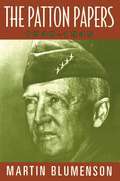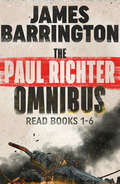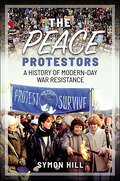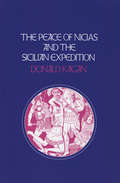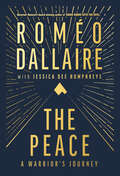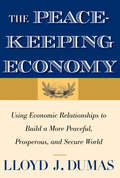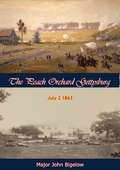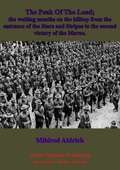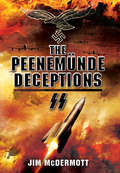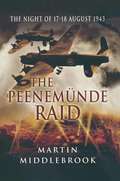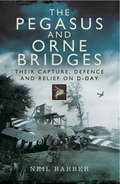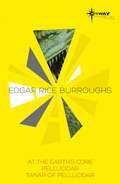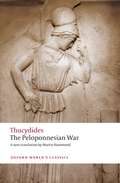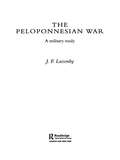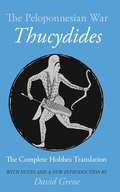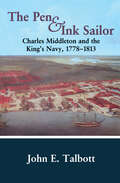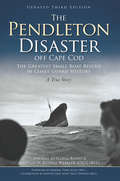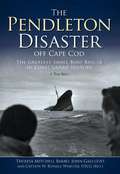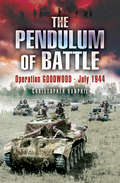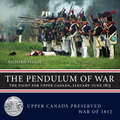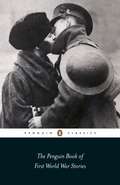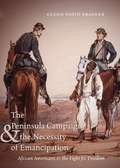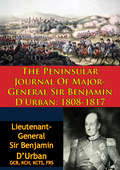- Table View
- List View
The Patton Papers: 1940-1945
by Martin BlumensonOne of World War II's most brilliant and controversial generals, George S. Patton (1885-1945) fought in North Africa and Sicily, as commander of the Third Army, spearheaded the Allies' spectacular 1944-1945 sweep through France, Belgium, and Germany. Martin Blumenson is the only historian to enjoy unlimited access to the vast Patton papers. his many books include Masters of the Art of Command (available from Da Capo Press) and Patton: The Man Behind the Legend.
The Paul Richter Omnibus (An Agent Paul Richter Thriller)
by James BarringtonThe bestselling military thrillers, now in a special omnibus editionPaul Richter: listed as working with the Foreign Operations Executive. Special forces and pilot experience. Trouble? Guaranteed. From supersonic chases above the Russian tundra to terrorists in Dubai and covert battles in North Korea, these are the most explosive thrillers you’ll ever read. This omnibus edition contains all six thrilling books in the series, perfect for fans of Robert Ludlum, Frederick Forsyth and Brad Thor.
The Peace Discourse in Europe, 1900-1945 (Routledge Studies in Modern European History)
by Alberto CastelliThis book charts ideas European intellectuals (mostly from Great Britain, France, Germany and Italy) put forward to solve the problem of war during the first half of the twentieth century: a period that began with the Anglo-Boer war and that ended with the explosion of the atomic bombs on Hiroshima and Nagasaki. Such ideas do not belong to a homogeneous tradition of thought, but can be understood as a unique discourse that takes different characteristics according to the point of view of each author and of the specific historical situation.
The Peace Protestors: A History of Modern-Day War Resistance
by Symon HillFrom Afghanistan to the Falklands, from Northern Ireland to Iraq, British troops are nearly always in action somewhere in the world. But whenever there is war, there will be people who resist it. Sometimes, they can draw on public sympathy. At other times, they stand alone against the crowd. Peace movements large and small have been a constant part of UK history, not least in the last 40 years. This book tells their stories. Drawing on interviews, fresh research and newly released government documents, the book sheds light on some of the most surprising and overlooked events of recent decades. Peace activists in the 1980s did not know that Margaret Thatcher's government feared that US troops on UK bases would fire on unarmed demonstrators. When the ceasefire came about in Northern Ireland, few noticed the peace work that Quakers had been doing behind the scenes for years. While the jingoistic atmosphere of the Falklands War is much remembered, there is less talk about the protests against it that saw more than 100 arrests at navy recruitment centres and public demonstrations. Four women who successfully disarmed a warplane in the 1990s were just a few of those to be acquitted after actions that could have resulted in years in prison. Apparent public support for the campaign against the Iraq war masked deep and bitter divisions amongst anti-war activists. Dissent and disobedience within the armed forces continues far from the public gaze. As recently as 2011, Michael Lyons was refused discharge from the Royal Navy despite developing a conscientious objection to war. He spent seven months in a military prison. This is a book that brings to life the realities of resistance by people whose refusal to conform has much to say about how we see the UK and British history today.
The Peace of Nicias and the Sicilian Expedition (A New History of the Peloponnesian War)
by Donald KaganWhy did the Peace of Nicias fail to reconcile Athens and Sparta? In the third volume of his landmark four-volume history of the Peloponnesian War, Donald Kagan examines the years between the signing of the peace treaty and the destruction of the Athenian expedition to Sicily in 413 B.C. The principal figure in the narrative is the Athenian politician and general Nicias, whose policies shaped the treaty and whose military strategies played a major role in the attack against Sicily.
The Peace: A Warrior's Journey
by Romeo DallaireInternational humanitarian icon and bestselling author General Roméo Dallaire guides readers on a crucial and inspiring journey from past wars through post-modern conflict toward a vision of lasting peace.In The Peace, Roméo Dallaire shows us the past, present and future of war through the prism of his own life. Trained in classic warfare during the Cold War era of mutual deterrence, Dallaire in good faith commanded the UN&’s peacekeeping mission for Rwanda in 1994, only to see the country abandoned and descend into the hell of genocide. The battered, tortured warrior who emerged from that catastrophe grew determined to help repair the new world disorder—to prevent genocide, abolish the use of child soldiers, and find ways to intervene in, even prevent, conflicts in defence of humanity. And so Dallaire helped advance the doctrines of Responsibility to Protect and the Will to Intervene only to witness those initiatives falter because of the same old power politics, national self-interest and general indifference that had allowed the genocide in Rwanda to unfold unchecked. In his final act, Dallaire has become a warrior working towards a better future in which those old paradigms are rejected and replaced. In The Peace he calls out the elements that undermine true security because they reinforce the dangerous, self-interested belief that &“balance&” of power and truces are the best we can do. Too often we say we are &“at peace&” because the bombs are falling elsewhere and we, ourselves, are not under attack. Dallaire shows us a path, instead, to what he calls &“the peace,&” a state where, above all else, humanity values the ties that bind us and the planet together—and acts accordingly. This book is the cri de coeur of a warrior who has been to hell and back and hopes to help guide us to a better place.
The Peacekeepers: A Novel (Star Trek: The Next Generation #2)
by Gene DeWeeseExploring a deserted alien spaceship, Lt. Commander Data and Lt. Geordi LaForge suddenly find themselves transported light-years away -- into the prison cell, into the middle of a deadly conflict! While Captain Picard and the crew of the U.S.S. EnterpriseTM search feverishly for the missing crewmen, Data and LaForge discover they are in a station almost identical to the one they were exploring, high in orbit around an Earth-type world. Years before, the occupants of that planet accidentally stumbled onto the ship and its advanced technology -- and since then have used its weapons to keep the nations on the planet below disarmed, and at peace. Now their own arrival has precipitated a crisis on the station. Somehow, Data and LaForge must find a way to restore trust between the planet below and the station's guardians up above -- before a final, destructive war breaks out!
The Peacekeeping Economy
by Lloyd J. DumasThe idea that military strength is virtually synonymous with security is deeply entrenched and widely held. But while the threat or use of military force may sometimes be necessary, it cannot keep us as safe as we would be by building relationships that replace hostility with a sense of mutual purpose and mutual gain. Economic relationships, says Lloyd J. Dumas, can offer a far more effective, and far less costly, means of maintaining security. After defining the right kind of economic relationship--one that is balanced and nonexploitative, emphasizes development, and minimizes environmental damage--Dumas then addresses some practical concerns in establishing and maintaining these relationships. He also considers the practical problems of the transition from military-based security arrangements to "economic peacekeeping," and the effects of demilitarized security on economic development and prosperity.
The Peach Orchard Gettysburg July 2 1863
by Major John BigelowMajor John Bigelow, formerly of Captain of the 9th Mass. Battery, gives an extensive and detailed account of the brutal struggle around the Peach Orchard at the pivotal battle of Gettysburg.Many volumes have been written about the Civil War and particularly the battle of Gettysburg; accounts of the second day of the battle often focus on the Union's successful defense of Little Round Top. However, the brutal fighting at the Peach Orchard deserve greater attention and specifically the account of the Union Artillery that faced Confederate General Longstreet’s attack on the Union left.
The Peak of the Load;: the waiting months on the hilltop from the entrance of the Stars and Stripes to the second victory of the Marne
by Mildred AldrichMildred Aldrich was born in Providence, Rhode Island, in 1853. After graduating from Everett High School in 1872, she taught elementary school in Boston, Massachusetts.Aldrich began her career as a journalist with the Boston Home Journal and later contributed to Arena and the Boston Herald. For a short period in 1892, she also edited the magazine, The Mahogany Tree.In 1898, Aldrich moved to France and while living in Paris became a close friend of Gertrude Stein. Aldrich worked as a foreign correspondent and newspaper critic until retiring to Huiry, a village on the outskirts of Paris. She wrote to Stein in June 1914: "It will be the bloodiest affair the world has ever seen - a war in the air, under the sea as well as on it, and carried out with the most effective man-slaughtering machines ever used in battle."During the First World War, Aldrich wrote A Hilltop on the Marne (1915), a book based on her journal entries (3rd June - 8th September 1914) and on letters she wrote to Gertrude Stein. The book sold well in the United States and she followed it with On the Edge of the War Zone (1917), The Peak of the Load (1918) and When Johnny Comes Marching Home (1919).The French government believed that Aldrich's work helped persuade the US government to declare war on Germany and in 1922 was awarded the Legion of Honour.Mildred Aldrich died in Huiry, France, on 19th February, 1928.Text taken, whole and complete, from the edition published in London: Constable, 1919.Original Page Count - 245 pages.
The Peenemunde Deceptions
by Jim McDermottThis WWII thriller by an acclaimed historian takes readers inside a secret Nazi weapons lab where treason and conspiracy lead to murder. In a windswept corner of the Third Reich stands the Peenemünde Army Research Center, where German military engineers invent weapons unlike any the world has seen before. Now Otto Fischer, a wounded Luftwaffe officer and former criminal investigator, has been summoned there to solve a seemingly incomprehensible case: the murder of a leading rocket engineer during a devastating air raid. With only days until the SS assume control of the production of a remarkable new weapon, Fischer must find a motive and perpetrator from among several thousand scientists, technicians, soldiers and forced laborers. As he struggles to get the measure of a secretive, brilliant world in which imagination moves far beyond the limits of technology, what at first appears to be a solitary crime draws him into a labyrinth of conspiracy, betrayal and treason.
The Peenemünde Raid: The Night of 17–18 August 1943
by Martin MiddlebrookThe author of The First Day on the Somme recounts Operation Hydra, the British bombing on a Nazi army research center during World War II. On the night of August 17-18, 1943, RAF Bomber Command attacked a remote research establishment on the German Baltic coast. The site was Peenemunde, where Hitler&’s scientists were developing both the V-1 flying bomb and the V-2 rocket whose destructive powers could have swung the course of the war. The raid was meticulously planned, and hopes were high. But the night sky was so cloudless that the British bombers presented an easy target for German night fighters, and over 40 were lost. Martin Middlebrook draws on the memories of over 400 people involved in the dramatic events on that night: RAF and Luftwaffe aircrew, German personnel at the research site, and foreign laborers who had been forced to work there. The result is a truly compelling account of this hazardous attempt to disrupt Hitler&’s V-weapons program.
The Pegasus and Orne Bridges: Their Capture, Defences and Relief on D-Day
by Neil BarberThis WWII history chronicles a daring airborne mission that was vital to the success of Operation Tonga, D-Day, and the liberation of France. When the British Army landed on Sword Beach in Normandy, their only exit eastward required passage across the River Orne and the Caen Canal. But the two bridges fording these waterways—the Pegasus and Orne Bridges—were heavily guarded and wired for demolition in case of a Germans retreat. Capturing these bridges would be next to impossible. Operation Deadstick, conducted by Major John Howard and his company of Oxford and Buckinghamshire Light Infantry, was a superbly daring, brilliantly executed 'coup de main' assault. The glider-borne troops not only seized both bridges but faced a ferocious and prolonged German counterattack. Neil Barber, a military historian and expert in British airborne operations, uses extensive personal accounts to tell this incredible story of Allied victory. Covering events and operations from Ranville in the East to Benouville in the West, Pegasus and Orne Bridges chronicles the combat of the 7th, 12th and 13th Parachute Battalions and reinforcements such as the Commandos, seaborne engineers and the Warwicks.
The Pellucidar SF Gateway Omnibus
by Edgar Rice BurroughsFrom the vaults of The SF Gateway, the most comprehensive digital library of classic SFF titles ever assembled, comes an ideal introduction to the fantastic worlds of one of the greatest adventure writers of all time, Edgar Rice Burroughs. The son of a Civil War veteran, Edgar Rice Burroughs was a prolific writer for the early pulp magazines. Famous the world over as the creator of Tarzan - and in SF circles for his Martian tales featuring John Carter - Burroughs is a household name. But there was more to him than apemen and four-armed Martians! This omnibus collects his tales of the world within a hollow Earth: At the Earth's Core, Pellucidar and Tanar of Pellucidar.
The Peloponnesian War
by Thucydides P. J. Rhodes Martin Hammond"The greatest historian that ever lived." Such was Macaulay's assessment of Thucydides (c. 460-400 BC) and his history of the Peloponnesian War, the momentous struggle between Athens and Sparta that lasted for twenty-seven years from 431 to 404 BC, involved virtually the whole of the Greek world, and ended in the fall of Athens. A participant in the war himself, Thucydides brings to his history an awesome intellect, brilliant narrative, and penetrating analysis of the nature of power, as it affects both states and individuals. Of the prose writers of the ancient world, Thucydides has had more lasting influence on western thought than all but Plato and Aristotle. This new edition combines a masterly new translation by Martin Hammond with comprehensive supporting material, including summaries of individual Books; textual notes; a comprehensive analytical index; an appendix on weights, measures and distances, money, and calendars; ten maps; an up-to-date bibliography; and an illuminating introduction by P.J. Rhodes.
The Peloponnesian War: A Military Study (Warfare and History)
by Professor J Lazenby J.F LazenbyThe range and extent of the Peloponnesian War of the fifth century BC has led to it being described as a 'world war' in miniature. With the struggle between Athens and Sparta at its core, the twenty-seven-year conflict drew in states from all points of the compass; from Byzantion in the north, Crete in the south, Asia Minor in the east and Sicily in the west.Since Thucydides described the war as 'the greatest disturbance to befall the Greeks' numerous studies have been made of individual episodes and topics. This authoritative work is the first single-volume study of the entire war to be published in over seventy-five years. Lazenby avoids the tendency of allowing historiography to obscure the analysis, and while paying due attention to detail, also looks at the fundamental questions of warfare raised by the conflict.Within a narrative framework, Lazenby concentrates on the fighting itself, and examining the way in which both strategy and tactics developed as the conflict spread. Not afraid to challenge accepted views, he assesses the war as a military rather than a political endeavour, evaluating issues such as the advantages and limitations of sea power. A readable and clear survey, this text offers a balanced discussion of controversial themes, and will appeal to ancient historians, classicists and all those who are interested in military history.
The Peloponnesian War: The Complete Hobbes Translation
by David Grene Thomas Hobbes ThucydidesThomas Hobbes's translation of Thucydides brings together the magisterial prose of one of the greatest writers of the English language and the depth of mind and experience of one of the greatest writers of history in any language.
The Pen and Ink Sailor: Charles Middleton and the King's Navy, 1778-1813 (Cass Series: Naval Policy and History)
by John E. TalbottExaminer of the Navy and the First Lord of the Admiralty during the Trafalgar Campaign, Sir Charles Middleton was responsible for creating vital links between the naval shore establishment, policy makers in Whitehall and commanders at sea.
The Pendleton Disaster Off Cape Cod: The Greatest Small Boat Rescue in Coast Guard History, A True Story (Disaster)
by Theresa Mitchell Barbo Captain W. Russell WebsterA first-hand account and fascinating new details of the 1952 rescue of the SS Pendleton, the true story behind the film The Finest Hours.On February 18, 1952, off the coast of Cape Cod, a fierce nor’easter snapped in half two 503-foot oil tankers, the Pendleton and the Fort Mercer. Human grace and grit, leadership and endurance prevail as Theresa Mitchell Barbo and Captain W. Russell Webster (Ret.) recount the historic, heroic rescue of thirty-two merchant mariners from the sinking Pendleton by four young Coast Guardsmen aboard the 36-foot motor lifeboat CG 36500. A foreword by former Commandant Admiral Thad Allen (Ret.) and an essay by Master Chief John “Jack” Downey (Ret.), a veteran of thousands of modern-day small boat rescues, round out the special third edition of this classic work on Coast Guard history.
The Pendleton Disaster off Cape Cod: The Greatest Small Boat Rescue in Coast Guard History
by John Galluzzo W. Russell Webster Theresa Mitchell BarboOn February 18, 1952, four Coast Guardsmen set out from Station Chatham in a 36-foot motor lifeboat to locate the mortally wounded T2 tanker Pendleton and rescue its crew during a storm. All four men knew the odds of surviving the storm were slim. Barbo, founder and president of the Cape Cod Maritime Research Association, tells the story of the greatest small boat rescue in Coast Guard history. There is no subject index.
The Pendulum of Battle: Operation Goodwood, July 1944
by Christopher DunphieAn account of the World War II clash between British and German forces, &“the largest tank battle involving British armor ever fought&” (MQ Magazine). Operation Goodwood, the largest tank battle involving British troops ever to have taken place, has been a perpetual subject of controversy. Was it intended as a breakout from the Normandy Bridgehead, or not? Was it a success or failure? Did it lead to a severe crisis in confidence over Field Marshal Montgomery&’s leadership? This book seeks to unearth the true background, reasons, aims and achievement of Goodwood, set in the context of the overall campaign, while bringing the battle to life through personal accounts of some of those involved, both British and German.&“This well-informed account provides an excellent balance between the strategy and tactics . . . Even in a year which is seeing an unprecedented number of books on the Second World War, Pendulum of Battle deserves to be read. It is a serious, yet highly readable study of warfare and can be warmly recommended.&” —MQ Magazine
The Pendulum of War: The Fight for Upper Canada, January—June1813
by Richard FeltoeThe second book in a series that is the definitive retelling of the War of 1812. In his second of six books in the series Upper Canada Preserved — War of 1812, author Richard Feltoe continues a battlefield chronicle that combines the best of modern historical research with extensive quotes from original official documents and personal letters, bringing to life the crucial first six months of the 1813 American campaign to invade and conquer Upper Canada. The Pendulum of War documents the course of more than seven major battles and over a dozen minor engagements that were fought on the St. Lawrence, Niagara, and Detroit frontiers to control Upper Canada during this period. It also reveals some of the behind-the-scenes personal stories and conflicts of the personalities involved.Throughout the work, historical images are counterpointed with modern pictures taken from the same perspective to give a true then-and-now effect. Strategic maps trace the course of the campaign, while never-before-published battlefield maps reveal the shifting formations of troops across a geographically accurate terrain.
The Penguin Book of First World War Stories
by Anne-Marie EinhausAn anthology of Great War short stories by British writers, both famous and lesser-known authors, men and women, during the war and after its end. These stories are able to illustrate the impact of the Great War on British society and culture and the many modes in which short fiction contributed to the war's literature. The selection covers different periods: the war years themselves, the famous boom years of the late 1920s to the more recent past in which the First World War has received new cultural interest.
The Peninsula Campaign and the Necessity of Emancipation
by Glenn David BrasherIn the Peninsula Campaign of spring 1862, Union general George B. McClellan failed in his plan to capture the Confederate capital and bring a quick end to the conflict. But the campaign saw something new in the war--the participation of African Americans in ways that were critical to the Union offensive. Ultimately, that participation influenced Lincoln's decision to issue the Emancipation Proclamation at the end of that year. Glenn David Brasher's unique narrative history delves into African American involvement in this pivotal military event, demonstrating that blacks contributed essential manpower and provided intelligence that shaped the campaign's military tactics and strategy and that their activities helped to convince many Northerners that emancipation was a military necessity.Drawing on the voices of Northern soldiers, civilians, politicians, and abolitionists as well as Southern soldiers, slaveholders, and the enslaved, Brasher focuses on the slaves themselves, whose actions showed that they understood from the outset that the war was about their freedom. As Brasher convincingly shows, the Peninsula Campaign was more important in affecting the decision for emancipation than the Battle of Antietam.
The Peninsular Journal Of Major-General Sir Benjamin D’Urban: 1808-1817
by Lieutenant-General Sir Benjamin D’Urban GCB KCH KCTS FRS Izac Jozua Rousseau"Whether among the first three to charge the French guns at Medellin, leading his troopers into the enemy ranks at Salamanca, or evolving order out of the chaos that bedevilled the Portuguese Army in 1809, Sir Benjamin D'Urban was not only a brave and resolute soldier but also a painstaking and highly efficient Chief of Staff to Marshal Beresford.Finding, on arrival at Corunna in October 1808, that he had been appointed to that part of the Army left behind in Portugal, D'Urban set out to meet Sir John Moore in the hope of receiving fresh orders. This was the beginning of six years unbroken service which included taking part in ten battles and sieges. After a short period as Staff Officer to Sir Robert Wilson, he was appointed Colonel and QMG to the Portuguese Army by Marshal Beresford in April 1809.The Journals give a day to day summary of the Peninsular Campaign, which was found invaluable by Sir Charles Oman, and provides a counter to what D'Urban considered unfair criticism of Beresford by Sir Charles Napier. Long out of print, this unique record of events fills a need for everyone interested in the campaigns of 1809-1815, particularly in regard to the operations of the Right Wing of the Allied Army and of the part played by the Portuguese Army, which has not always received the credit due for some of its major exploits.The post-war Journals, 1815-1817, bring a telling insight to the problems faced by Beresford and his British officers as the Regents in Portugal aim at the destruction of the proud Army, so lovingly and laboriously created by the Marshal and his staff."-Print ed.
